Martial Peak Reviews
False Idols, penned by Darcy Dahlia, is an intriguing exploration into the murky depths of celebrity culture and the cost of fame in modern society. Dahlia, who is known for her crisp prose and compelling character development, dives into a world where the glitter of the spotlight often obscures darker truths. The novel, structured around the lives of three main characters, offers a multifaceted look at ambition, betrayal, and the search for authenticity in a world that often rewards facade over reality.
At the heart of False Idols are the intertwined destinies of its protagonists: Lila Monroe, a young and ambitious actress; Jack Silver, a seasoned music producer; and Casey Bright, a tech entrepreneur. Each character is drawn vividly, with their aspirations and insecurities laid bare to the reader. Lila, who hails from a small town, captivates with her relentless pursuit of stardom, which she believes will validate her existence. Jack, in contrast, is portrayed as a cynic who has seen the rise and fall of many stars and yet finds himself unable to escape the lure of the industry. Meanwhile, Casey’s narrative introduces a technological edge to the storyline, discussing the impact of social media on perception and fame.
Dahlia navigates through their lives with a deft touch, interweaving their experiences in the cutthroat Hollywood environment. The setting itself becomes a palpable force, influencing actions and decisions. As Lila faces the challenging and often sordid realities behind the camera, Jack’s storyline exposes the manipulation in the music world, and Casey’s success is shadowed by online vitriol and the invasive nature of celebrity culture. Dahlia’s critique is sharp—she strips down the glamorous façade to expose a world built as much on illusion as on talent.
The narrative is bolstered by Dahlia’s poignant use of dialogue and inner monologues, revealing the characters' complexities. Lila's transition from naivety to a rueful understanding of the entertainment industry’s demands is particularly compelling. Jack, on the other hand, provides a somewhat grim but insightful perspective into the eternal cycle of talent use and disposal prevalent in the music sector. Casey’s contribution to the narrative explores the ethical dilemmas posed by new technologies that can make or break careers with an algorithm's impartiality. Furthermore, Dahlia skillfully introduces secondary characters and subplots that echo the central themes of the main narrative, enriching the reader’s understanding of the world she constructs.
Stylistically, Dahlia’s writing is sophisticated yet accessible. Her descriptions are vivid, painting both the allure and the corrosive aspects of Hollywood with equal skill. The pacing of the book is brisk, with a narrative momentum that makes it hard to put down, but there are moments of introspection that allow for character depth and thematic development. These pauses are crucial, giving the reader space to contemplate the broader societal critiques nestled within the plot.
One of the standout features of False Idols is its unflinching honesty. It does not shy away from showing the unglamorous sides of glamour, the loneliness that often accompanies public adulation, and the sheer unpredictability of the entertainment industry. Yet, it isn’t all bleak; there are moments of genuine affection, creative fulfillment, and personal triumph that save the characters from cynicism, suggesting that authenticity and integrity may still be possible in this dazzling but daunting world.
The novel also feels remarkably relevant, reflecting current discussions about fame, mental health, and privacy. With the rise of influencer culture and the relentless scrutiny public figures face, Dahlia’s commentary on the cost of fame resonates deeply. False Idols encourages readers to question what they see, reminding them of the manipulation often involved in creating a public persona.
In conclusion, Darcy Dahlia’s False Idols is a compelling read that offers both a critique and a celebration of the entertainment industry. It highlights the human stories behind the public figures and prompts reflection on our own consumption of celebrity cultures. Rich in detail and emotion, the novel is a poignant reminder of the complexities behind the often idolized world of fame. For those who are fascinated by the spectacle of celebrity and the intrinsic human desire for recognition, False Idols provides a deep, unvarnished look into the mirror of our contemporary culture.
























Reviews 0
Post a Reviews: